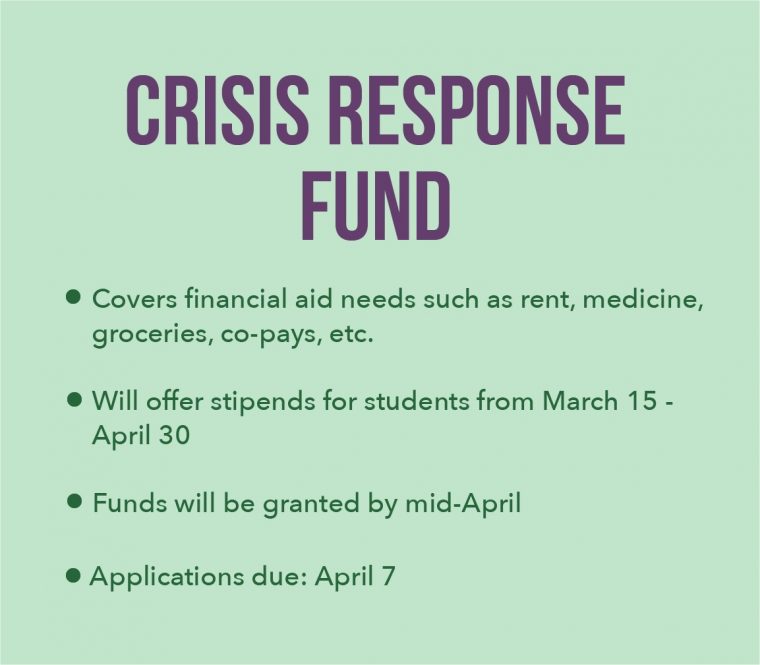Administration | News | Student Union
WU creates emergency fund to support students and employees in need during COVID-19 pandemic
Students and employees in need of emergency funding during the COVID-19 pandemic can apply for financial support through the Crisis Response Student Fund or the Crisis Response Employee Fund, which will continue to accept applications for stipends through the end of the day today.
 Graphic by Mia Goldberg
Graphic by Mia Goldberg The University created the funds in response to the COVID-19 outbreak as a way to help students and employees address unexpected financial needs, such as rent, groceries, medicine and medical copays, that have arisen from the changing circumstances and the uncertainty caused by the pandemic. It is the largest-scale emergency fund in University history.
The Student Fund will provide stipends to students to meet financial needs from March 15 to April 30. The University will decide later this month if it will be able to offer more funding after that date. At the time of publication, more than 400 students have applied for a stipend through the Student Fund.
“The WashU Crisis Response Fund for Students is designed to provide financial resources for Washington University students who, as a result of unexpected additional costs or loss of income, need emergency financial support to pay for essential needs, such as housing, food and medicine,” Dean of the College of Arts and Sciences Jennifer Smith wrote in an email to the student body, March 31.
Applications for the funds can be made online, where applicants will fill out a form detailing information about their current situation, what they need funding for and how much they are requesting. There are no restrictions on which students can apply for the Student Fund.
According to information from Executive Vice Chancellor for A&D Programs Pam Henson and Entrepreneurship Center Managing Director II Luscri, the fund aims to help the most vulnerable students in emergency situations.
Each application will be reviewed by several members of the University and each stipend’s amount is decided on a case-by-case manner, with no set minimum or maximum amounts for stipends. The number and the size of requests granted will determine how many of the requests can be met, meaning that there is no guarantee that everyone who applies for funding will receive it.
“While we will make every effort to offer some emergency funding for stipend requests that meet the criteria laid out above, we know that it will not be possible for us to grant every request,” Smith wrote.
Money for the Student Fund and the Employee Fund has come through donations from alumni and friends of the University, as well as other sources including Student Union, which contributed $80,000 to the fund out of its annual budget.
“The treasury almost unanimously [16-1] came to the decision that the funding, because programming was no longer possible, would be best spent towards addressing student needs” SU President freshman Ranen Miao said.
Miao hopes that the Crisis Response Fund will supplement SU’s advocacy efforts on behalf of the student body by providing students in need with necessary funding.
“We also acknowledged that there were financial costs beyond just advocacy that were really important and were affecting students and we wanted to make sure that we were helping students in the best way that we could with that money,” Miao said.
At the time of publication, more than 260 donations had been made to the Student Fund.
After the April 7 deadline, students who are granted a stipend will receive their funds in mid-April.
